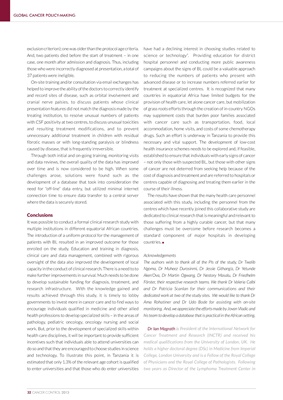
GLOBAL CANCER POLICY-MAKING
exclusion criterion); one was older than the protocol age criteria. have had a declining interest in choosing studies related to
And, two patients died before the start of treatment – in one science or technology9. Providing education for district
case, one month after admission and diagnosis. Thus, including hospital personnel and conducting more public awareness
those who were incorrectly diagnosed at presentation, a total of campaigns about the signs of BL could be a valuable approach
37 patients were ineligible. to reducing the numbers of patients who present with
On-site training and/or consultation via email exchanges has advanced disease or to increase numbers referred earlier for
helped to improve the ability of the doctors to correctly identify treatment at specialized centres. It is recognized that many
and record sites of disease, such as orbital involvement and countries in equatorial Africa have limited budgets for the
cranial nerve palsies, to discuss patients whose clinical provision of health care, let alone cancer care, but mobilization
presentation features did not match the diagnosis made by the of grass roots efforts through the creation of in-country NGOs
treating institution, to resolve unusual numbers of patients may supplement costs that burden poor families associated
with CSF positivity at two centres, to discuss unusual toxicities with cancer care such as transportation, food, local
and resulting treatment modifications, and to prevent accommodation, home visits, and costs of some chemotherapy
unnecessary additional treatment in children with residual drugs. Such an effort is underway in Tanzania to provide this
fibrotic masses or with long-standing paralysis or blindness necessary and vital support. The development of low-cost
caused by disease, that is frequently irreversible. health insurance schemes needs to be explored and, if feasible,
Through both initial and on-going training, monitoring visits established to ensure that individuals with early signs of cancer
and data reviews, the overall quality of the data has improved – not only those with suspected BL, but those with other signs
over time and is now considered to be high. When some of cancer are not deterred from seeking help because of the
challenges arose, solutions were found such as the cost of diagnosis and treatment and are referred to hospitals or
development of a database that took into consideration the centres capable of diagnosing and treating them earlier in the
need for “off-line” data entry, but utilized minimal internet course of their illness.
connection time to ensure data transfer to a central server The results have shown that the many health care personnel
where the data is securely stored. associated with this study, including the personnel from the
centres which have recently joined this collaborative study are
Conclusions dedicated to clinical research that is meaningful and relevant to
It was possible to conduct a formal clinical research study with those suffering from a highly curable cancer, but that many
multiple institutions in different equatorial African countries. challenges must be overcome before research becomes a
The introduction of a uniform protocol for the management of standard component of major hospitals in developing
patients with BL resulted in an improved outcome for those countries. l
enrolled on the study. Education and training in diagnosis,
clinical care and data management, combined with rigorous Acknowledgements
oversight of the data also improved the development of local The authors wish to thank all of the PIs of the study, Dr Twalib
capacity in the conduct of clinical research. There is a need to to Ngoma, Dr Muheez Durosinmi, Dr Jessie Githang’a, Dr Yetunde
make further improvements in survival. Much needs to be done Aken’Ova, Dr Martin Ogwang, Dr Nestory Masalu, Dr Friedhelm
to develop sustainable funding for diagnosis, treatment, and Förster, their respective research teams. We thank Dr Valeria Calbi
research infrastructure. With the knowledge gained and and Dr Patricia Scanlan for their communications and their
results achieved through this study, it is timely to lobby dedicated work at two of the study sites. We would like to thank Dr
governments to invest more in cancer care and to find ways to Ama Rohatiner and Dr Udo Bode for assisting with on-site
encourage individuals qualified in medicine and other allied monitoring. And, we appreciate the efforts made by Jovan Vladic and
health professions to develop specialized skills – in the areas of his team to develop a database that is practical in the African setting.
pathology, pediatric oncology, oncology nursing and social
work. But, prior to the development of specialized skills within Dr Ian Magrath is President of the International Network for
health care disciplines, it will be important to provide sufficient Cancer Treatment and Research (INCTR) and received his
incentives such that individuals able to attend universities can medical qualifications from the University of London, UK. He
do so and that they are encouraged to choose studies in science holds a higher doctoral degree (DSc) in Medicine from Imperial
and technology. To illustrate this point, in Tanzania it is College, London University and is a Fellow of the Royal College
estimated that only 1.3% of the relevant age cohort is qualified of Physicians and the Royal College of Pathologists. Following
to enter universities and that those who do enter universities two years as Director of the Lymphoma Treatment Center in
32 CANCER CONTROL 2013